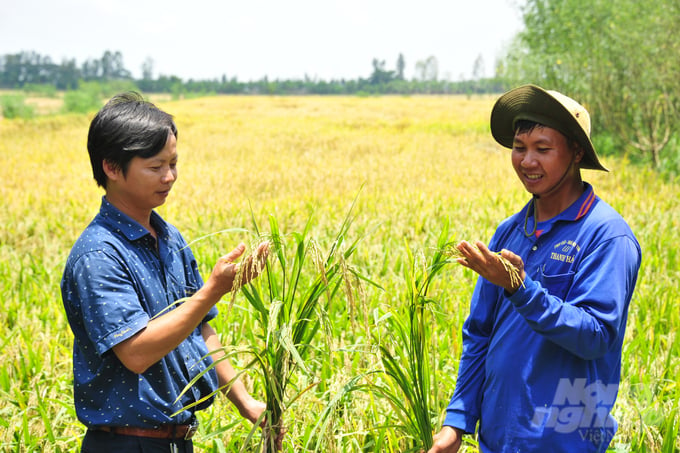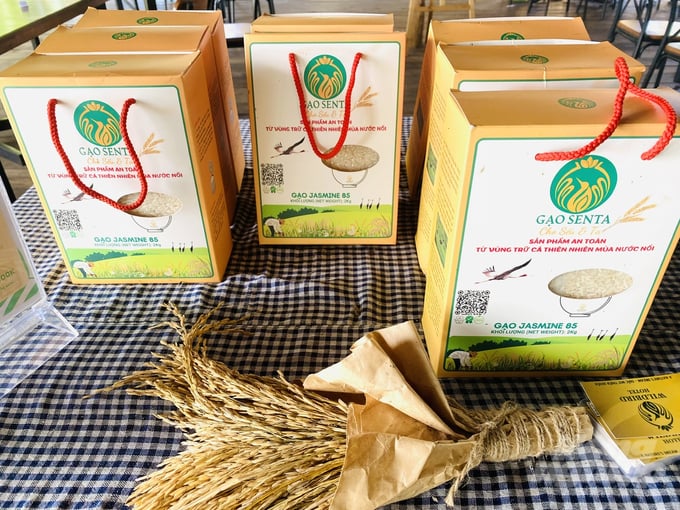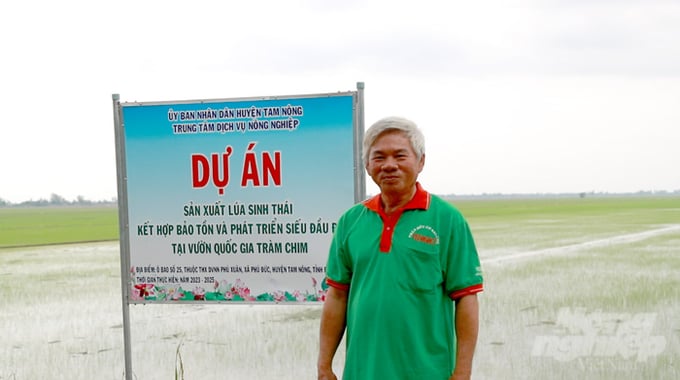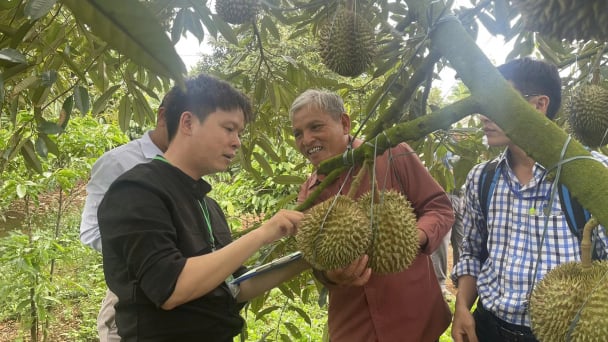June 1, 2025 | 00:57 GMT +7
June 1, 2025 | 00:57 GMT +7
Hotline: 0913.378.918
June 1, 2025 | 00:57 GMT +7
Hotline: 0913.378.918
Ecological rice cultivation not only minimizes the impact of agricultural chemicals but also takes advantage of the flood season to restore the field ecosystem.

Starting from the 2023 - 2024 winter-spring season, the ecological rice cultivation project was initiated over an area of 200 hectares adjacent to Zone A4 of Tram Chim National Park. Photo: Le Hoang Vu.
Red-Crowned crane conservation and development plan
The conservation of red-crowned cranes at Tram Chim National Park in Tam Nong District, Dong Thap Province, is not only an environmental mission but also a commitment of humanity to nature. Dong Thap has actualized this pledge through the Red-Crowned Crane Conservation and Development Plan, which integrates ecosystem restoration with the establishment of a sustainable ecological rice production model. This model not only contributes to environmental protection but also provides a new direction for farmers by linking agricultural production with conservation and economic development.
From the 2023 - 2024 winter-spring season, the ecological rice cultivation project has been launched over 200 hectares in areas adjacent to Zone A4 of Tram Chim National Park, covering sub-areas 25 (Phu Duc Commune) and 43B (Tan Cong Sinh Commune), Tam Nong District. By 2032, this model is expected to expand across the entire buffer zone, symbolizing the harmony between agricultural production and biodiversity conservation.
With organic farming practices, the ecological rice fields not only reduce the impact of agricultural chemicals but also leverage the benefits of the flood season to restore the field ecosystem. Notably, the growth of this model opens up opportunities to build the brand Tam Nong Crane Rice, a distinctive product catering to both domestic and export markets, creating stable income and improving the well-being of local communities.

Organic rice - a distinctive product targeting both domestic and export markets. Photo: Le Hoang Vu
To realize this goal, the participation of 12,000 households living around the buffer zone is crucial. The project began in the summer-autumn crop of 2023, covering 39 hectares with only four participating farmers. However, after four cultivation seasons, the area expanded to 312.5 hectares with 41 households joining by the summer-autumn crop of 2024, demonstrating the strong unity within the community.
According to Mr. Nguyen Van Man, one of the pioneering farmers in Phu Duc Commune, reducing the seeding rate from 20kg to 10kg per công (0.1 hectare) has significantly lowered production costs. Farmers involved in the project avoid burning straw, reducing air pollution and environmental harm. "Previously, we relied heavily on chemical fertilizers, but now we only use organic ones. While rice yield has slightly decreased, actual profits have increased thanks to cost savings," Mr. Man shared.
This shift in farming practices not only brings economic benefits but also fosters a green, clean, and beautiful environment, creating favorable conditions for the return of red-crowned cranes. For the people of Tam Nong, these cranes are not only ecologically significant but also hold deep spiritual value. The red-crowned crane symbolizes prosperity, and wherever they return, the livelihoods of local people thrive.
Mr. Tran Thanh Nam, Chairman of the Tam Nong District People's Committee, stated that the district currently has 170 hectares of organic rice production. The district is also actively promoting sustainable organic agriculture, including plans to implement electronic field logbook applications and monitor fields using smart devices. Additionally, the district has registered trademarks for rice produced by Quyết Tiến Cooperative and invested in equipment for post-rice processing, such as rice flour, cosmetics, and pharmaceuticals. The district also encourages investment from companies to link with farmers for rice production and consumption.
In parallel, the district is developing economic models for cooperatives, collaborative groups, and community hubs, utilizing locally sourced straw for mushroom cultivation, organic substrate production, traditional composting, and livestock feed, thereby increasing household income. Integrating rice production with ecological technology enhances landscapes and attracts natural predators while promoting experiential tourism.
Notably, the ecological rice models in Tam Nong go beyond environmental protection, playing a crucial role in restoring the ecosystem at Tram Chim National Park. Reducing the use of agricultural chemicals improves soil and water quality, fostering the recovery and development of the natural ecosystem.

Farmer Nguyen Van Man (Phu Duc Commune, Tam Nong District) in an ecological rice field. Photo: Le Hoang Vu.
Mr. Nam emphasized that the ecological rice fields in the district are also expected to integrate with eco-tourism, transforming the rice paddies into attractive destinations for visitors. This not only enhances the commercial value of rice products but also generates income for the community, contributing to sustainable economic development.
Although the ecological rice fields in Tam Nong have brought about significant changes, the number of red-crowned cranes returning remains limited. However, ecological rice farming is more than just a cultivation practice, it is a mission to protect life. It enables farmers to prosper not only financially but also with pride in contributing to a healthier environment for future generations.
And in those lush green fields, the calls of the red-crowned cranes will resonate as a reminder of the inseparable bond between humans and nature.
Translated by Kieu Chi

(VAN) For the durian industry to succeed, the value chain must fulfill its commitments to the government, the community, and international partners.

(VAN) Vaccinating juvenile pangasius helps reduce disease, antibiotic use, and farming costs, increasing profits for export-oriented farmers in An Giang.

(VAN) Due to a limited supply of workforce and competitive recruitment requirements, businesses struggle to retain talented veterinary human resources.

(VAN) WOAH’s guidance aims to mitigate disease risks through a One Health approach that balances economic, conservation, and public health interests.

(VAN) Ms. Nguyen Thi Dung, Deputy Director of Ngoc Hoang Cooperative, shared about the journey of bringing dragon fruit to Europe, achieving annual revenues in the billions of VND.

(VAN) Bamboo products from Thang Tho Bamboo Cooperative have reached many countries around the world, while also creating jobs for local workers.

(VAN) The Management Board of Con Dao National Park reported that a green sea turtle, tagged in the Philippines, has traveled thousands of kilometers to lay 84 eggs on Bay Canh Islet.